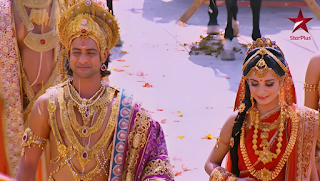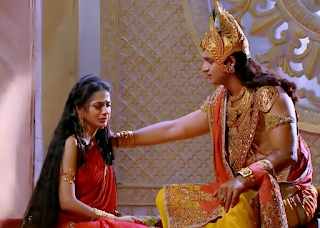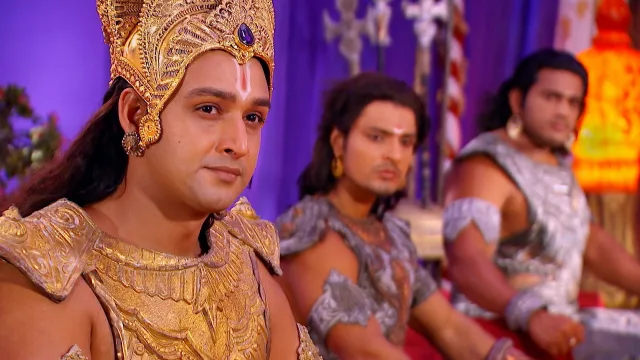Mahabharata Breakdown #1: The 270 Episodes that changed my perspective on relationships, politics and the very definition of righteousness
Recently, I binge-watched a TV series, I would have normally scrolled past. The 2013 Star Plus TV Series - Mahabharat. I am not a huge fan of the TV or Film industry trying to dramatize Indian Epics (read: Adipurush) and felt these are best left for consumption in paperback format. That’s how I have read Ramayana and only have watched a single TV Series (which I really admired) revolving around it on Star Plus. Coincidently, this one had aired on the same channel which made me think twice.
I am aware that I am (only) ten years late here. The series is a huge hit nationwide as well as worldwide. The music is even more popular and being able to play the theme song on a keyboard was considered a cool factor, among us kids, back in school days. The plethora of characters in Mahabharat had always confused me and made me stick to Ramayana alone for most of my childhood. Nonetheless, I decided to give this series a watch so it could be an introduction to the great epic for me.
I had heard from someone that the reason Mahabharat is so revered is because of its ubiquitousness. You could find every person from your life matching the personality traits of someone in the Mahabharat . This was probably my number one reason to watch the show — to understand how different people reacted to certain events and the very definition of right and wrong they perceived and upheld.
There are so many things to discuss about. As the title of this article goes, let’s focus on each theme individually. Whether you have watched the show or not, I encourage you to read ahead.
Relations: Relationships 101 defined in Mahabharat
The show beautifully portrays every relationship in the epic - that between husband-wife, mother-son, father-son, father-daughter, teacher-student, brothers, sisters, and even friends. Most importantly, it portrays all these relationships with a set of two examples - the good kind and the bad kind. You may ask - how can a relationship between parent and child be negative? Well, it could and it still does. All the negative set of examples of the relationship led to the War of Kurukshetra in one way or another.
Gandhari, the mother of the 101 Kauravas, decides to blindfold herself at the time of marriage. While she exhibits relentless compassion by blinding herself to feel the same darkness as her husband does, she also ends up turning a blind eye to every mistake her husband and son commit over time. On the other hand, Kunti, the mother of the Pandavs, raises her kids with good virtues without even the comfort of the palace that the kids deserve. Thus, Dhritarashtra’s sons carry forward the negative vibe while Pandu’s sons carry forward his goodwill and nature, in their hearts. If children are merely a reflection of their parents, then one wonders how much polishing and cleaning the mirror needs for a clearer reflection.
But parentage is not the only cause of the child’s personality. It is also the experiences that shape them. This is where Karna comes in. Born to a princess, and meant to be a king, however, being raised in a charioteer’s home makes him challenge the very society that condemns him for his unmatched archery skills. But upon receiving the first hand of friendship that offers him solace instead of ridicule, he devotes his entire life to Duryodhan without questioning his virtues. Makes you think about whether all friendships are actually good because of the comfort they provide you.
Another place where personality develops is school or as they said in olden times, Gurukul. Guru Drona is the only teacher here. A common teacher for honing the skills of his students - the Kauravas and the Pandavas. Does he discriminate among his students? Probably not. But a few incidents, make young Arjun question his own skills such as, why his teacher refused to teach Eklavya and Karna. Was it to make Arjun appear mightier than the rest? While Guru Drona does repent his actions, he is unable to break the oath of Hastinapur - to teach anyone but the Princes of Hastinapur kingdom. Made me think again, Should a teacher constrain his knowledge to a few because of personal issues or promises? Or fulfil his duty nonetheless?
Among all these, the best of the relationships is that between Krishna and Arjuna or probably Krishna and Draupadi. To both of them, Krishna is a friend. A friend with the right advice. He prepares Arjun for the unfair time in his future. He makes sure the brothers stay together, no matter what. To Draupadi, he is probably her first-ever friend in the world. He is there for her when she is treated unfairly in the Hastinapur court and offers her solace after Duryodhan and Dushashan’s heinous act of disrobing her in court. In Krishna, I saw not only a friend but also a diplomat beyond contemporaries which we will look into, in the next section.Politics: Who shall be the next King?
Everything seemed to be going really well after Dhritarashtra was made the interim king to the throne of Hastinapur, so where does the internal politics come in? For that, you need a cunning man, someone like… Shakuni, the King of Gandhar, and brother to Queen Gandhari. Believing his sister to have fallen prey to the Bhishma’s ploy and marrying a blind man, Shakuni decided to avenge his sister by making sure Dhritarashtra and more importantly his heir has the ultimate right to the throne.
This is where Kunti’s nephew steps in. Vasudev Krishna. His personality frightens Shakuni who believes Krishna should not be made an enemy. Why? Unlike the Pandavas headed by Yudhishthira, who always upheld laws and rules, Krishna believed rules could be turned and twisted too if they were done for the greater good (welfare of all and not just one).
Krishna decided to side with the Pandavas and Shakuni believes he finally met a match. However, believing Krishna to be his match was Shakuni's ultimate mistake.
Many sequences in the show highlight the politics of Hastinapur but the best one I found was the one in which Arjun marries Subhadra (Krishna’s sister) in Dwarka. Before you understand this sequence, there are some things to keep in mind:
- This happens at a point when, Indraprastha, a city established by the Pandavas through their own efforts, is about to soon become independent of the Kingdom of Hastinapur which it originally belonged to. Indraprastha has achieved all the prerequisites required to become independent and for the final sanction, needs only the approval of King Dhritarashtra.
- The Win-Win-Win Shakuni Scheme: Shakuni does not want Indraprastha to become an independent state. If it happened, it would be the first successful step for Pandavs in establishing a kingdom of their own. It would gain the Pandavs immense popularity in the hearts of the commoners.
- Shakuni is aware of Krishna’s support for the Pandavs and to break this alliance he advices Dhritarashtra to get Dwarka’s support for Hastinapur, before the Pandav brothers, by getting Duryodhan married to the Princess of Dwarka, Subhadra,.
- This would ensure Krishna would stand with Hastinapur at all times even against the Pandavs, who would then dare not raise their weapon against Krishna.
However, Subhadra innately loves Arjun so Krishna asks her to elope with Arjun before her marriage with Duryodhan happens. Upon hearing the news of the bride eloping, Bhishma and everyone from Hastinapur are shocked and feel betrayed. Arjun’s mother, Kunti, is torn apart in a dilemma whether to offer her blessings to her son or not. Why you may ask? Here’s the thing:
- To offer blessings would be an act of treachery for someone from the court of Hastinapur
- Not offering blessings to Arjun would be an act of declaring Indraprastha an independent state of its own. This would foil Shakuni’s plans all together and give the Pandavs an independent state of their own.
This scene was absolutely brilliant in its portrayal of the state politics present during the times. Many such scenes are present, while both Pandavs and Kauravs are preparing their army for the final war. Lots of ploys and schemes are unrolled to gather support for the war. But why does the war occur in the first place? Why did Krishna, God Himself, allow for such a blood bath to happen? For that, we all have to understand the most important concept discussed in the show - Dharma or Righteousness.
Dharma: What is the Righteousness you are fighting for? Is it worth it?
What is Dharma? What does being right even mean? In Hastinapur alone, everyone had their own preconceived notion of what was right. For Bhishma, it was upholding the oath he had taken and following the traditions set by the older generations. For Guru Drona, it was fighting righteously but being swayed by the love of his son, he forgets to take a stand of his own. For King Dhritarashtra, it was making sure his son was not treated unfairly because of being born to a blind father. For Karna, it was only allegiance to his friend Duryodhan who stood for him when others ridiculed him. For Pandavs, it was following their elder brother Yudhishthira, who was the epitome of good virtues and righteousness. So, were they all correct?
Being right is not just about speaking the truth and doing correct things for oneself to keep one’s image clean. Rather it is for everyone’s welfare. To uphold the honor of others when attacked by cunning and evil people. To give up one’s own prejudices or traditions to help others achieve a greater good. The greater Dharma is to see others’ Dharma as your own and take a step in that direction.
But that still does not answer the question… why War? A war that completely wiped out generations of the Kuru dynasty in 18 days. Were those deaths necessary? I felt those questions can be answered much more thoroughly in the next three articles as we dive deeper into the lives of three key figures of the Epic… who were responsible for not stopping the war.
-Aditya









Comments
Post a Comment